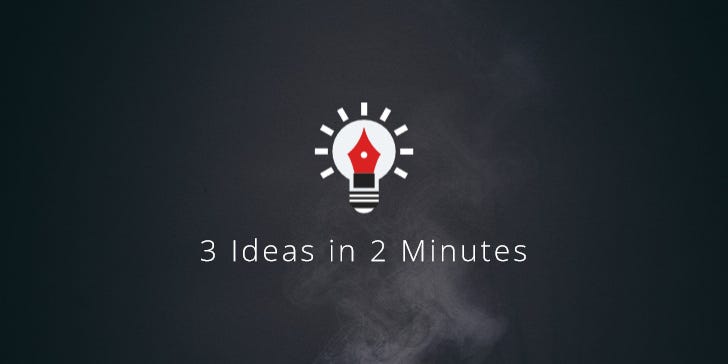#201: Schopenhauer’s Warning, Gurwinder's Third Paradox & Tactical Empathy
3 Ideas in 2 Minutes on the Futility of Debate
I. Schopenhauer’s Warning
Arthur Schopenhauer’s wisdom hits hard reliably. Here’s the German philosopher questioning the idea of changing people’s minds through debate:
Never combat any man’s opinion; for though you reached the age of Methuselah, you would never have done setting him right upon all the absurd things that he believes. It is also well to avoid correcting people’s mistakes in conversation, however good your intentions may be; for it is easy to offend people, and difficult, if not impossible to mend them.
—Arthur Schopenhauer
II. Gurwinder’s Third Paradox
Writer Gurwinder Bhogal takes this idea one step further, with Gurwinder’s Third Paradox:
In order for you to beat someone in a debate, your opponent needs to realize they’ve lost. Therefore, it’s easier to win an argument against a genius than an idiot.
—Gurwinder Bhogal
However, I’d add that the purpose of a public debate is not so much to convince your opponent. It’s to win over the audience or the judges. In the same way, the winner of the 100m sprint couldn’t care less if the runner-up refuses to concede.
III. Tactical Empathy
I’ve written about it many times and in many forms, but it’s worth repeating. The best way to win a debate and get what you want is not to throw ironclad arguments at those fools who refuse to see things your way. It’s to see the world through their eyes and to reflect their worldview back to them.
Call it the Ideological Turing Test, Perception vs. Perspective, Rapoport’s Rule, or frame it as a negotiation principle called Tactical Empathy. It’s all pretty much the same idea. According to negotiation expert Chris Voss, Tactical Empathy is the invaluable skill of understanding and showing awareness of someone’s emotions and perspective to build trust and influence your counterpart. It involves:
labelling of their emotions (“Sounds like you’re angry.”)
Mirroring (repeating the last few words someone said) to make the other person feel heard and prompt them to elaborate, or
the careful use of Dynamic Silence to allow others to think and respond.
The important part here is that verbalising someone else’s perspective is not to be confused with agreement. But it paves the way for collaboration in any negotiation. 🐘
Have a great week,
Chris
themindcollection.com


(File under ‘sucess,’ the way to)
“ The way to success is strategically along the way of least expectation and tactically along the line of least resistance. “
William Tecumseh Sherman, Union General, Civil War